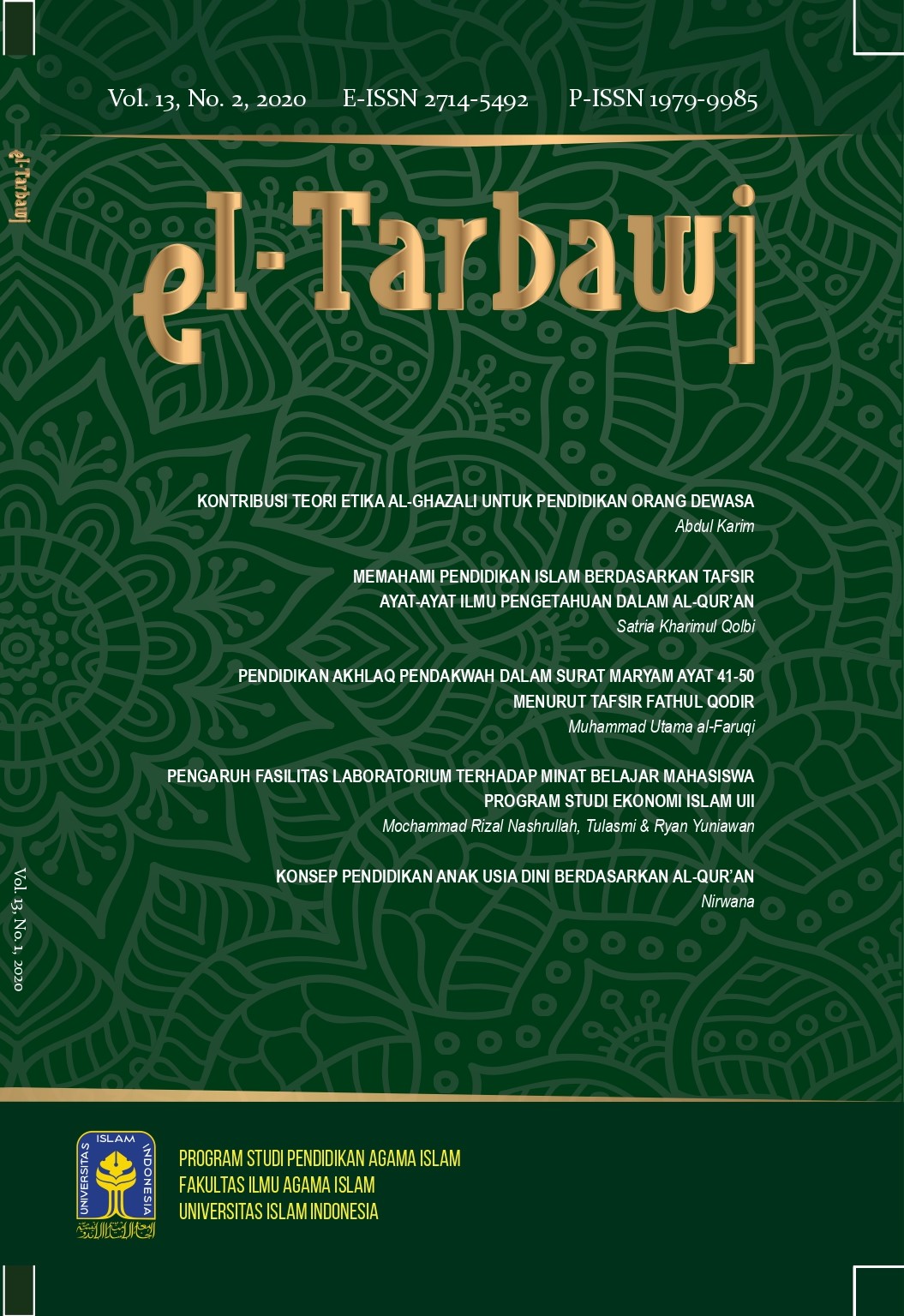Main Article Content
Abstract
Education is very much related to knowledge and science. Therefore, it is important to understand education on the concept of knowledge. In this context, in order to understand the concept of education in Islam, we need to scrutiny the verses on which al-Qur’an talk about knowledge and science. This method of writing thematically collects the verses of the al-Qur'an that discuss a certain topic and arranges them as much as possible according to the period of their revelation. With deductive reasoning, we draw conclusions from various theories and reviews. Science is the effort from a process carried out by methods and produces a systematic and structured new knowledge that will be used as a basic guideline for humans. There are three laws on learning difference sciences: compulsory, sunnah and haram. One of the most important benefit of learning is increasing the dignity of learners. Application in science can be done early in formal education in accordance with the verses of the Al-Quran.
Keywords
Article Details
Copyright (c) 2021 EL TARBAWI

This work is licensed under a Creative Commons Attribution-ShareAlike 4.0 International License.
Authors retain copyright and grant the journal right of first publication with the work simultaneously licensed under a Creative Commons Attribution (CC-BY-SA) 4.0 License that allows others to share the work with an acknowledgment of the work’s authorship and initial publication in this journal.
References
- Abidin, M. Zainal. (2010). Konsep Ilmu dalam Islam: Tinjauan terhadap Makna, Hakikat dan Sumber-sumber Ilmu dalam Islam. Ilmu Usshuludin Vol. 10, No. 1.
- Al-Sheikh, D. A. (2003). Tafsir Ibnu Katsir Jilid 8. Bogor: Pustaka Imam Asyafi'i.
- Dalimunthe, Sehat Sultoni. 2018. Filsafat Pendidikan Islam Sebuah Bangunan Ilmu Islamic Studies. Yogyakarta: Deepublish.
- Darmadi, D. H. (2018). Mendidik Adalah Cinta: Menjelajah Pendidikan Rumah Anak di Rumah dan Sekolah. Surakarta: CV Oase Grup.
- Darmadi, H. (2017). Integrasi Agama dan Ilmu Pengetahuan. Yogyakarta: Diandra Kreatif.
- Djamil, A. H. (2015). Agar Menuntut Ilmu Jadi Lebih Mudah. Jakarta: Komputindo.
- Hamka, P. D. (1965). Tafsir Al Azhar. Jakarta: Pustaka Nasional PTE LTD Singapura.
- Ibnu Katsir, Ismail bin Umar. (2003). Tafsir Ibnu Katsir. Bogor: Pustaka Imam As-Syafi'i
- Iryani, Eva. (2017). Al Qur'an dan Ilmu Pengetahuan. Jurnal Ilmiah Universitas Batanghari Jambi, Vol. 17, No. 3.
- Ahmad. (2015). Tafsir Pendidikan: Konsep Pendidikan Berbasis Al Qur'an. Bandung: Humaniora.
- Kosim, Muhammad. (2008). Ilmu Pengetahuan Dalam Islam: Perspektif Filosofis-Historis. Tadris Jurnal Pendidikan Islam Vol. 3., No. 2.
- Makhmudah, Siti. (2018). Hakikat Ilmu Pengetahuan dalam Perspektif Modern dan Islam. Al-Murabbi, Vol. 4., No. 2.
- Mardani. (2015). Hukum Islam; Pengantar Ilmu Hukum Islam di Indonesia. Yogyakarta: Pustaka Pelajar.
- Mundiri. (2000). Logika. Jakarta: Raja Grafindo Persada.
- Maragustam. (2015). Paradigma Revolusi Mental dalam Pembentukan Karakter Bangsa Berbasis Sinergitas Islam dan Filsafat Pendidikan. Jurnal Pendidikan Agama Islam Vol. 12, No. 2.
- Rohidin. (2016). Pengantar Hukum Islam dari Semenanjung Arabia Menuju Indonesia. Yogyakarta: Lintang Rasi Aksara Books.
- Roqib, M. (2009). Ilmu Pendidikan Islam Pengembangan Pendidikan Integratif di Sekolah, Keluarga, dan Masyarakat. Yogyakarta: LKIS.
- Shihab, M.Quraish. (1997). Ensiklopedia Al Qur'an. Jakarta: Yayasan Bimantara.
- _______________. (1998). Menyikapi Tafsir Ilahi. Jakarta: Lentera Hati.
- Santalia, Indo. (2013). Metode Ilmu menurut Perspektif Al-Qur'an. Tafsere Vol. 1., No. 1.
- Sulistyoko, Arie. (2018). Tanggung Jawab Keluarga dalam Pendidikan Anak di Era Kosmopolitan: Tela'ah Tafsir Kontemporer atas Surat At Tahrim Ayat 6. Iqro: Journal of Islamic Education Vol.1, No.2.
- Taufik. (2019). Integrasi Nilai Pendidikan Iman dan Ilmu Pengetahuan dalam Tafsir Al-Misbah: Kajian Surat Al-Mujadilah 58:11. Jurnal Pendidikan Islam, Vol 1, No.2.
- Utsaimin, S. M. (2005). Syarah Adab dan Manfaat Menuntut Ilmu. Jakarta: Pustaka Imam Asy-Syafi'i.
- Wahana, P. (2016). Filsafat Ilmu Pengetahuan. Yogyakarta: Pustaka Diamond.
- Zainuddin, Ali. (2006). Hukum Islam, Pengantar Ilmu Hukum Islam di Indonesia. Jakarta: Sinar Grafika.
References
Abidin, M. Zainal. (2010). Konsep Ilmu dalam Islam: Tinjauan terhadap Makna, Hakikat dan Sumber-sumber Ilmu dalam Islam. Ilmu Usshuludin Vol. 10, No. 1.
Al-Sheikh, D. A. (2003). Tafsir Ibnu Katsir Jilid 8. Bogor: Pustaka Imam Asyafi'i.
Dalimunthe, Sehat Sultoni. 2018. Filsafat Pendidikan Islam Sebuah Bangunan Ilmu Islamic Studies. Yogyakarta: Deepublish.
Darmadi, D. H. (2018). Mendidik Adalah Cinta: Menjelajah Pendidikan Rumah Anak di Rumah dan Sekolah. Surakarta: CV Oase Grup.
Darmadi, H. (2017). Integrasi Agama dan Ilmu Pengetahuan. Yogyakarta: Diandra Kreatif.
Djamil, A. H. (2015). Agar Menuntut Ilmu Jadi Lebih Mudah. Jakarta: Komputindo.
Hamka, P. D. (1965). Tafsir Al Azhar. Jakarta: Pustaka Nasional PTE LTD Singapura.
Ibnu Katsir, Ismail bin Umar. (2003). Tafsir Ibnu Katsir. Bogor: Pustaka Imam As-Syafi'i
Iryani, Eva. (2017). Al Qur'an dan Ilmu Pengetahuan. Jurnal Ilmiah Universitas Batanghari Jambi, Vol. 17, No. 3.
Ahmad. (2015). Tafsir Pendidikan: Konsep Pendidikan Berbasis Al Qur'an. Bandung: Humaniora.
Kosim, Muhammad. (2008). Ilmu Pengetahuan Dalam Islam: Perspektif Filosofis-Historis. Tadris Jurnal Pendidikan Islam Vol. 3., No. 2.
Makhmudah, Siti. (2018). Hakikat Ilmu Pengetahuan dalam Perspektif Modern dan Islam. Al-Murabbi, Vol. 4., No. 2.
Mardani. (2015). Hukum Islam; Pengantar Ilmu Hukum Islam di Indonesia. Yogyakarta: Pustaka Pelajar.
Mundiri. (2000). Logika. Jakarta: Raja Grafindo Persada.
Maragustam. (2015). Paradigma Revolusi Mental dalam Pembentukan Karakter Bangsa Berbasis Sinergitas Islam dan Filsafat Pendidikan. Jurnal Pendidikan Agama Islam Vol. 12, No. 2.
Rohidin. (2016). Pengantar Hukum Islam dari Semenanjung Arabia Menuju Indonesia. Yogyakarta: Lintang Rasi Aksara Books.
Roqib, M. (2009). Ilmu Pendidikan Islam Pengembangan Pendidikan Integratif di Sekolah, Keluarga, dan Masyarakat. Yogyakarta: LKIS.
Shihab, M.Quraish. (1997). Ensiklopedia Al Qur'an. Jakarta: Yayasan Bimantara.
_______________. (1998). Menyikapi Tafsir Ilahi. Jakarta: Lentera Hati.
Santalia, Indo. (2013). Metode Ilmu menurut Perspektif Al-Qur'an. Tafsere Vol. 1., No. 1.
Sulistyoko, Arie. (2018). Tanggung Jawab Keluarga dalam Pendidikan Anak di Era Kosmopolitan: Tela'ah Tafsir Kontemporer atas Surat At Tahrim Ayat 6. Iqro: Journal of Islamic Education Vol.1, No.2.
Taufik. (2019). Integrasi Nilai Pendidikan Iman dan Ilmu Pengetahuan dalam Tafsir Al-Misbah: Kajian Surat Al-Mujadilah 58:11. Jurnal Pendidikan Islam, Vol 1, No.2.
Utsaimin, S. M. (2005). Syarah Adab dan Manfaat Menuntut Ilmu. Jakarta: Pustaka Imam Asy-Syafi'i.
Wahana, P. (2016). Filsafat Ilmu Pengetahuan. Yogyakarta: Pustaka Diamond.
Zainuddin, Ali. (2006). Hukum Islam, Pengantar Ilmu Hukum Islam di Indonesia. Jakarta: Sinar Grafika.
